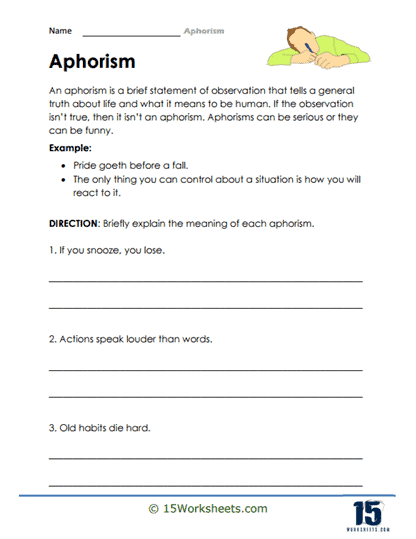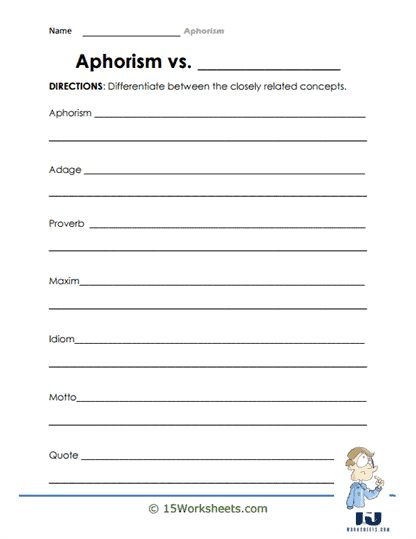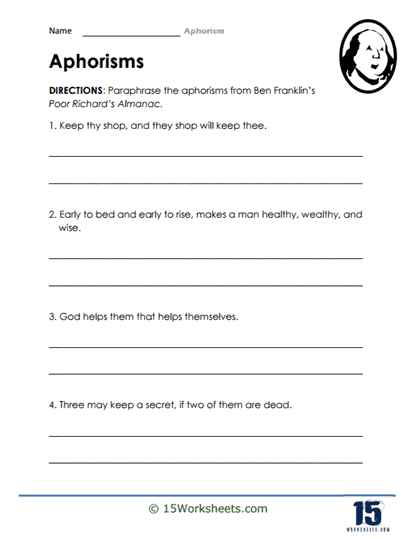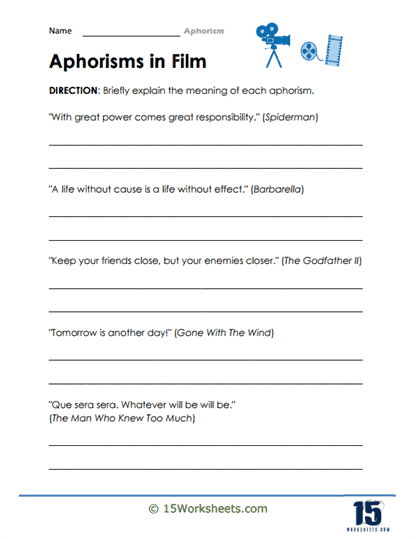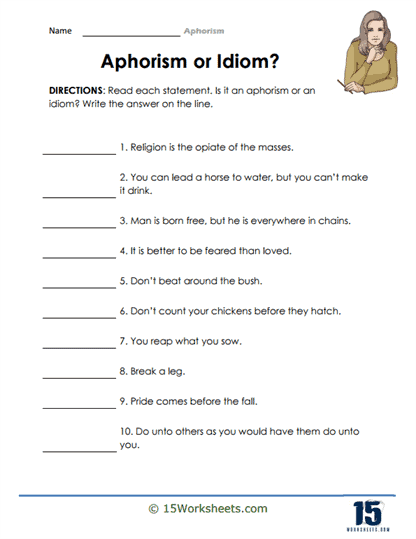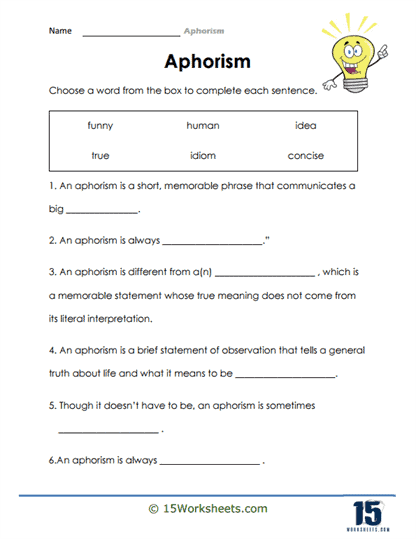Aphorism Worksheets
All About These 15 Worksheets
Aphorisms, concise and often witty statements that convey profound truths or insights, are like pearls of wisdom in the tapestry of language and thought. Understanding and mastering aphorisms is not just about appreciating clever sayings; it’s about honing skills in critical thinking, language analysis, and the art of communication. In a world where clarity, brevity, and wisdom are highly valued, students must develop the ability to recognize, interpret, and craft aphorisms.
To empower students with the art of aphorisms and its manifold applications, we proudly present a collection of 15 worksheets on Aphorisms. These worksheets are meticulously designed to provide students with structured and engaging opportunities to explore, practice, and master the art of aphorisms.
What’s An Aphorism?
So, what’s an aphorism? It sounds like a tricky word, but it’s simple. An aphorism is a brief, clever statement that reveals a big truth about life. They’re like little nuggets of wisdom that people can carry in their pockets. An example is “Actions speak louder than words.” This means that what people do shows more about them than what they say.
These worksheets are made up of several different parts. The first section might have some famous aphorisms, and your task is to explain what they mean. For example, if you see “The pen is mightier than the sword,” you could explain that it means words and ideas (the pen) are more powerful in changing the world than force or violence (the sword).
The next section might give you a situation, and you need to come up with an aphorism that fits. Let’s say, the situation is “a friend who’s always talking about doing things but never actually does anything.” You might say, “Actions speak louder than words” or create a new aphorism like, “Talk is cheap without the walk.”
The third section may challenge you to come up with your own aphorisms from scratch. For instance, if you always do your homework early to avoid stress, you might come up with something like, “A task done today saves the worries of tomorrow.”
These worksheets can be super fun and also very useful. They make you think deeply about life and how things work, helping you become wiser. And they also improve your writing and communication skills, because an aphorism is like a mini-story packed into one line. When you get good at understanding and creating aphorisms, you’ll be a master at expressing big ideas in a short and punchy way!
Why Do Authors Use Aphorism?
Aphorism is a powerful literary device, and authors use it in their work for several reasons:
To Convey Wisdom or Truth – An aphorism is a short statement that expresses a general truth or observation about life. Authors use them to succinctly convey wisdom or insight to their readers. An example is “Knowledge is power.”
To Make a Point Memorable – Because of their concise and catchy nature, aphorisms are often easy to remember. Authors use them to make certain points stand out in the reader’s mind. It’s like highlighting the most important part of a note.
To Prompt Reflection – Aphorisms often present a nugget of wisdom in a way that prompts the reader to pause and reflect. They can be a way of encouraging readers to think more deeply about a concept or idea.
To Add Depth to Characters – Authors might have characters speak in aphorisms to reveal something about their wisdom, background, or personality. For example, a character who frequently uses aphorisms might be seen as wise, or as a mentor figure.
To Advance the Plot – In some cases, an aphorism might serve as a thematic motif in a story, or as a guiding principle that drives the plot forward. It could even represent a turning point for a character’s decision or development.
To Engage the Reader – Aphorisms can also engage readers by offering them something to agree or disagree with. They can stir up a conversation or a debate, making the reading experience more interactive.
To Condense Complex Ideas – Aphorisms allow authors to condense complex or abstract ideas into a brief, digestible format. This can make difficult concepts more accessible to readers.
The Importance of Understanding Aphorisms For Students
Understanding aphorisms and their various forms is of great importance for several reasons:
- Language Proficiency: Aphorisms are a testament to the power of language to encapsulate complex ideas in a few words, promoting linguistic dexterity and expression.
- Critical Thinking: Analyzing aphorisms challenges students to think critically about the layers of meaning, symbolism, and wit embedded in concise statements.
- Communication Skills: Proficiency in employing aphorisms enhances students’ ability to convey ideas succinctly, making their communication more impactful and memorable.
- Literary Appreciation: Aphorisms are a literary device often used by poets, essayists, and philosophers. Understanding aphorisms enables students to appreciate the artistry of language in literature.
This collection of Aphorism worksheets is a valuable resource for educators and parents committed to nurturing language proficiency, critical thinking, and effective communication in students. Proficiency in recognizing, creating, and appreciating aphorisms equips individuals with the tools to engage with language on a deeper level, express profound ideas succinctly, and appreciate the artistry of language and rhetoric.
This collection is an investment in their future success, ensuring they have the linguistic skills to communicate with impact, clarity, and wisdom. Embrace these Aphorism worksheets today, and watch your students become adept wordsmiths who can skillfully craft and interpret aphorisms, the pearls of wisdom that enrich the language and human experience.

